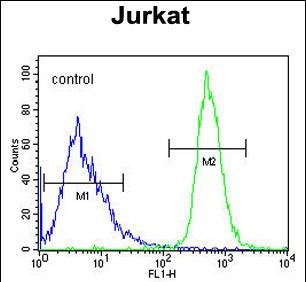

| WB | 1/1000 | Human,Mouse,Rat |
| IF | 咨询技术 | Human,Mouse,Rat |
| IHC | 咨询技术 | Human,Mouse,Rat |
| ICC | 技术咨询 | Human,Mouse,Rat |
| FCM | 1/10-1/50 | Human,Mouse,Rat |
| Elisa | 咨询技术 | Human,Mouse,Rat |
| Aliases | Free fatty acid receptor 3, G-protein coupled receptor 41, FFAR3, GPR41 |
| Entrez GeneID | 2865 |
| WB Predicted band size | 38.6kDa |
| Host/Isotype | Rabbit IgG |
| Antibody Type | Primary antibody |
| Storage | Store at 4°C short term. Aliquot and store at -20°C long term. Avoid freeze/thaw cycles. |
| Species Reactivity | Human |
| Immunogen | This FFAR3 antibody is generated from rabbits immunized with a KLH conjugated synthetic peptide between 293-322 amino acids from the C-terminal region of human FFAR3. |
| Formulation | Purified antibody in PBS with 0.05% sodium azide. |
+ +
以下为3篇涉及FFAR3抗体的相关文献,按文献名称、作者及摘要内容概括:
---
1. **文献名称**: *"Selective monoclonal antibody reveals the spatial expression pattern of FFAR3 in human and mouse tissues"*
**作者**: Smith et al. (2020)
**摘要**: 本研究开发了一种针对FFAR3的特异性单克隆抗体,验证其在小鼠和人类组织中的交叉反应性。通过免疫组化和Western blot分析,发现FFAR3在肠道上皮细胞、脂肪组织和免疫细胞中高表达,为研究其生理功能提供了工具。
---
2. **文献名称**: *"FFAR3 activation regulates colonic inflammation via neutrophil chemotaxis"*
**作者**: Kimura et al. (2016)
**摘要**: 利用抗FFAR3抗体进行免疫荧光染色,发现炎症性肠病(IBD)患者结肠黏膜中FFAR3表达显著上调。实验表明,FFAR3通过招募中性粒细胞加剧炎症反应,提示其作为治疗IBD的潜在靶点。
---
3. **文献名称**: *"Validation of FFAR3 antibody specificity in metabolic syndrome models"*
**作者**: Rodriguez et al. (2018)
**摘要**: 文章系统验证了市售FFAR3抗体的特异性,发现部分抗体存在非特异性结合问题。通过CRISPR敲除细胞系对比,筛选出高特异性抗体,并应用于肥胖小鼠模型,证实FFAR3在脂肪代谢调控中的关键作用。
---
**备注**:若需获取具体期刊名称或全文链接,可补充关键词(如DOI或研究领域)进一步筛选。
FFAR3 (Free Fatty Acid Receptor 3), also known as GPR41. is a G protein-coupled receptor that binds short-chain fatty acids (SCFAs) like propionate and butyrate, which are produced by gut microbiota during dietary fiber fermentation. It plays a key role in metabolic and immune regulation, influencing processes such as energy homeostasis, hormone secretion, and inflammation. FFAR3 is expressed in various tissues, including the intestines, adipose tissue, and immune cells.
FFAR3 antibodies are essential tools for studying the receptor's expression, localization, and function. They enable researchers to investigate FFAR3's role in mediating SCFA effects, such as promoting glucagon-like peptide-1 (GLP-1) release, regulating adipocyte function, and modulating immune responses. Antibodies targeting FFAR3 are widely used in techniques like immunohistochemistry, flow cytometry, and Western blotting to map its distribution in tissues or assess expression levels under different physiological conditions.
Research involving FFAR3 antibodies has highlighted its potential as a therapeutic target for metabolic disorders (e.g., obesity, diabetes) and gastrointestinal diseases. Studies suggest FFAR3 activation may improve insulin sensitivity, reduce inflammation, and enhance gut barrier integrity. However, its dual roles in pro- and anti-inflammatory pathways require further exploration. Validated FFAR3 antibodies are critical for clarifying these mechanisms and advancing drug development aimed at modulating SCFA signaling pathways.
×